'Puerto Rico 20' expansion set 1 'new building' play report that will change the crop production system with the addition of churches, libraries, lighthouses, etc.

The new Japanese version of the board game 'Puerto Rico ', which appeared in 2002,
The long-awaited Japanese localization of the European-style monument! ]
— Engames @ Game Market 2021 Autumn Area B11 (@EngamesToyama) August 1, 2021
Engames is working with Mobius Games to create a new Japanese version of Puerto Rico, 'Puerto Rico 20'!
A masterpiece game in which the interaction between players during the variable phase is troublesome. In addition to the expansion set released in the past, a new expansion 'festival' is also included. pic.twitter.com/BDsyNiM8lz
The state of playing in the basic set is summarized in the following article.
I tried playing the board game 'Puerto Rico 20' aiming for success in the new world by repeating farmland reclamation, building construction, and crop shipping --GIGAZINE

◆ Contents of building tiles added in Expansion 1
Expansion 1 'New Building' consists of 12 types of building tiles and 2 types of large building tiles. The left side of the photo is the building tile of the basic set, the right side is the building tile of expansion 1, and the green name is expansion 1, so you can easily distinguish it. When playing, in order from the start player, select one of the basic / expansion 1 building tiles and place it in a place according to the construction cost, and exclude the unselected building tiles from the game. This time it's an expansion, so I'll play with the building tiles of Expansion 1.
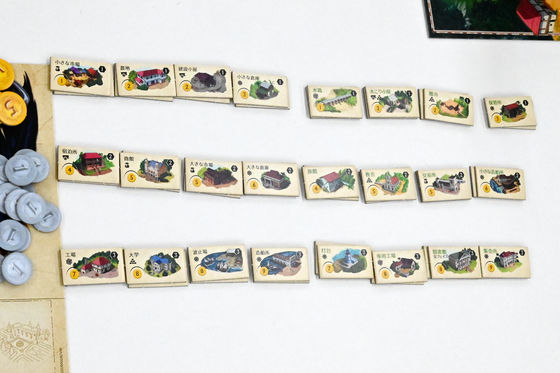
The added building 'Waterway' will give you another crop when at least one crop is produced in the 'Large Indigo Vat' and 'Large Sugar Refinery'. No effect can be obtained with 'small indigo tubs' and 'small sugar refineries'.
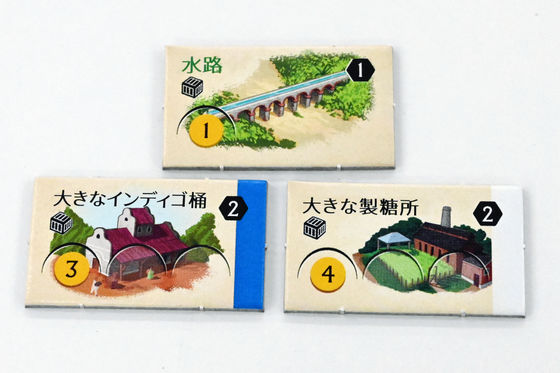
In the basic set, there was a 'factory' where you can get 1 doubloon if you have 2 types of products, 2 doubloons if you have 3 types, 3 doubloons if you have 3 types, and 5 doubloons if you have 4 types. The 'factory' will give you a doubloon with a production volume of the most produced type of merchandise minus one. For example, if you produce 3 indigo and 4 sugar, you will get 3 doubloons for 4 minus 1. Corn is not considered as it is not made in the factory.
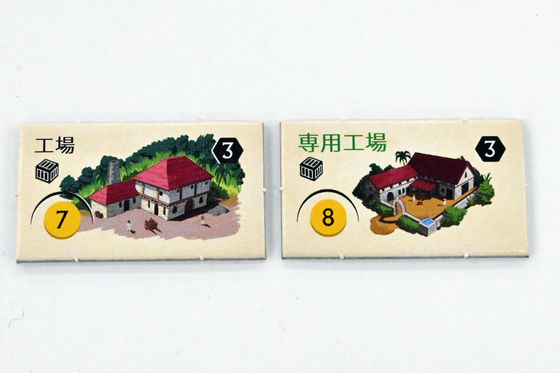
The basic set 'Shipyard' was a building where you could get the corresponding victory points by loading all of any one type of merchandise into your own cargo ship (returning it to supply without clogging the cargo ship) during the captain's phase. .. The 'small shipyard' in Expansion 1 is treated in the same way as the 'shipyard', but different types of merchandise pieces can be loaded onto a unique cargo ship. Instead, you will only get 1 victory point for every 2 merchandise pieces.
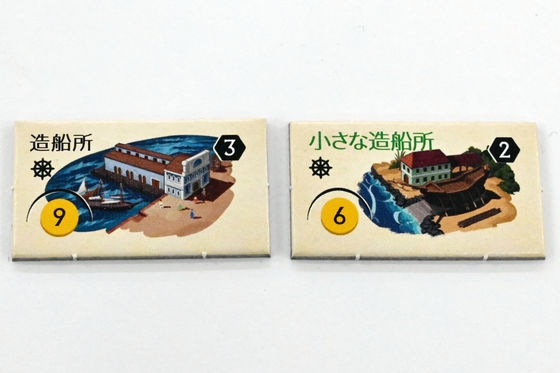
Similarly, the 'small warehouse' and 'large warehouse' of the basic set, and the 'storage' of expansion 1 are also involved in the captain phase. Only one piece of merchandise that could not be loaded on the cargo ship during the captain's phase will be stored in the port, and all others will be discarded (returned to supply). However, if you have a 'small warehouse', you can store all one type of merchandise pieces, and if you have a 'large warehouse', you can store all two types of merchandise pieces. The 'storage' is a building that can store 3 arbitrary product pieces, and when combined with the storage capacity of the port, it can store '4 types of product pieces one by one' and '4 types of product pieces'. is.
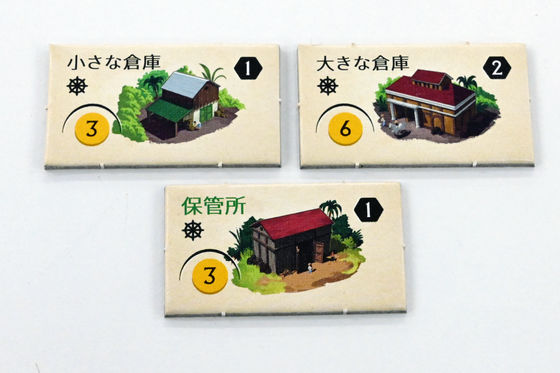
The basic set 'Wharf' is a building where you can get an additional 1 victory point each time you ship a product. Expansion 1's 'Lighthouse' is similar to 'Wharf', but with an additional 1 doubloon instead of victory points. When you play your turn for the first time in the Captain Phase, the 'Meeting Hall' will get 1 victory point for every 2 items of the same type in the port before shipping the item.
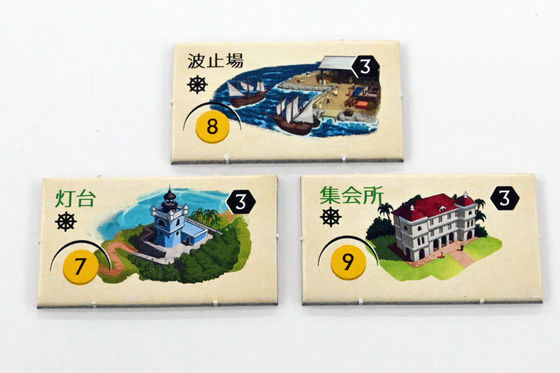
These three are related to the Merchant Phase. The 'small market' of the basic set is a building where you can get an additional 1 doubloon when you sell a product, and the 'big market' is a building where you can get an additional 2 doubloons. On the other hand, if there is an expansion 1 'Trading Post', the player can sell the item to the store or sell any one item piece to his trading post (return it to the supply) to get the normal amount of doubloons. Will be. A store may not be able to sell depending on the existing product, but at a trading post, you can sell any piece because there is no duplication.
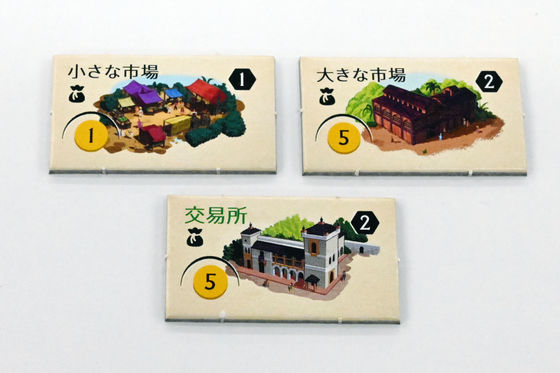
The 'Lumberjack Hut' is a building related to the Pioneer Phase and can be placed as a 'Forest' with the farm tiles you have acquired face down. For every two forests, you can reduce the construction cost by 1 doubloon. You cannot turn an already-placed farm into a forest. In the picture below, there are 4 forests, so the construction cost can be reduced by 2 doubloons.
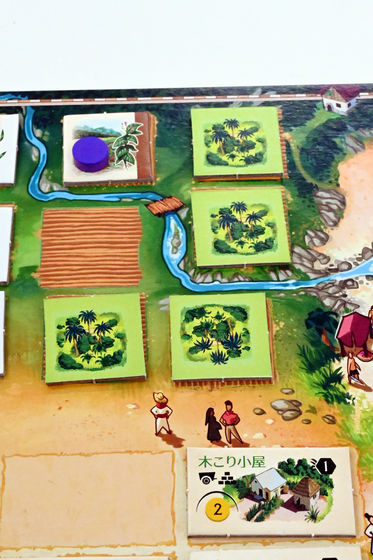
'Black Market' has the effect that you can pay up to 1 worker piece, 1 arbitrary product piece, and 1 victory point when constructing a building. However, since doubloons must not remain at hand after use, the image is that the shortage of doubloons will be supplemented with worker pieces, merchandise pieces, and victory points. You won't get anything at the time of construction of the 'Church', but in the subsequent Architect Phase, you will build 1 victory point and a 4th tier building (large building) for each building on the 2nd and 3rd tiers of the game board. You will get 2 victory points for each.
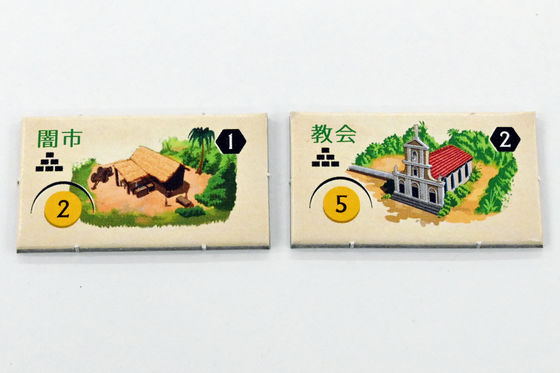
You can place up to two worker pieces in the 'Ryokan' during the Master Phase. Workers at the inn can move to buildings, farms and quarries at any time to get the effect if possible. Having a 'library' doubles the effect of role privileges. If you are a pioneer, you can get a farm or quarry when you activate the privilege for the first time, but you cannot get a quarry when you activate the privilege for the second time.
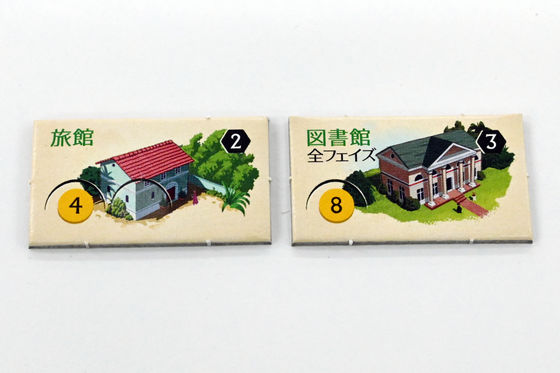
The large building has 5 types of basic set and 2 types of expansion 1. This is also used by selecting 5 types from 7 types in the same way as normal building tiles. This time I excluded the guild hall and the official residence.
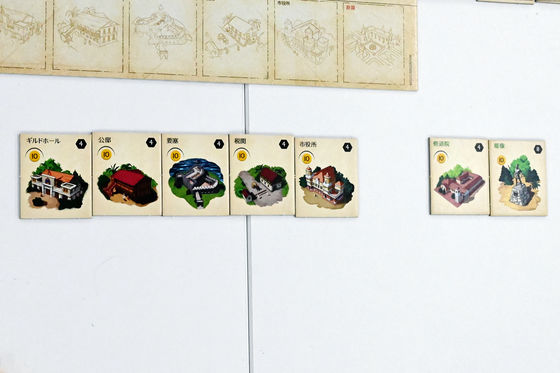
'Statues' and 'monasteries' will be added. If you build a 'statue', you will get 8 victory points at the end of the game, and there is no need to place workers. However, there is no additional effect. 'Monastery' is a set of 3 island tiles (any farm or quarry), and at the end of the game, 1 set will give you 1 victory point, 2 sets will give you 3 victory points, 3 sets will give you 6 victory points, and 4 sets will give you 1 victory point. Earn an additional 10 victory points.
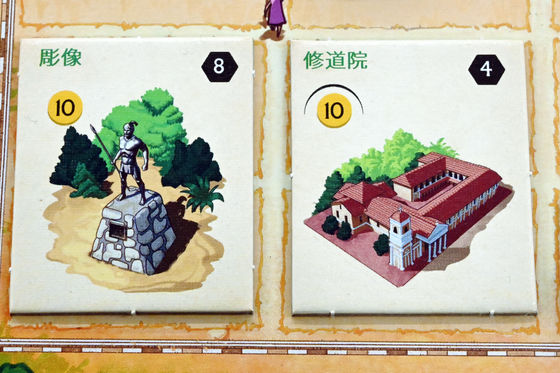
Other preparations are the same as for the basic set. The start player and 2nd player have indigo plantation tiles, and the 3rd and 4th players have corn plantation tiles, each with an initial funding of 3 doubloons.
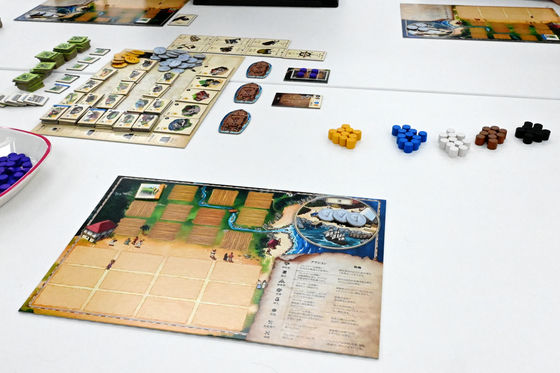
◆ Gameplay
This play was 4th, so I started with a corn plantation. The first phase was a 'pioneer', so I got a sugar plantation.
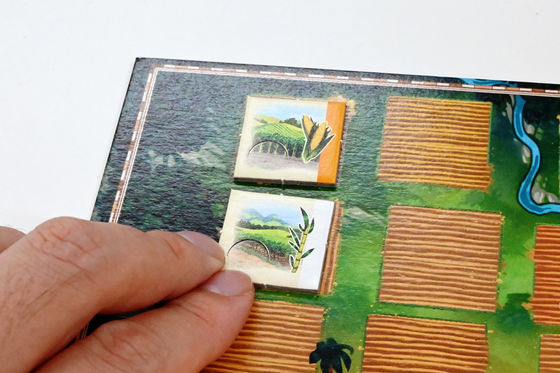
Phase 2 is an 'architect', so pay 2 doubloons to build a small sugar refinery.
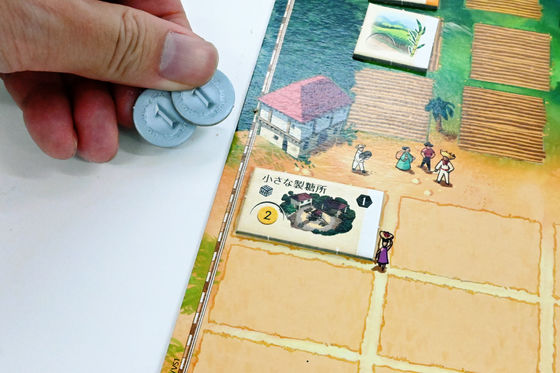
It's your turn to choose a role in Phase 4, but since the production system is not yet in place for 4th in the first round, you can simply save doubloons by 'digging gold veins'.
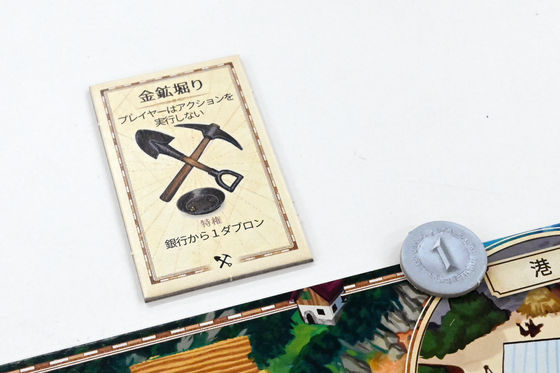
Eventually, I got a tobacco plantation, but I didn't have a 'tobacco storage' to produce tobacco yet, and there was only one worker, so I placed it in a corn plantation.
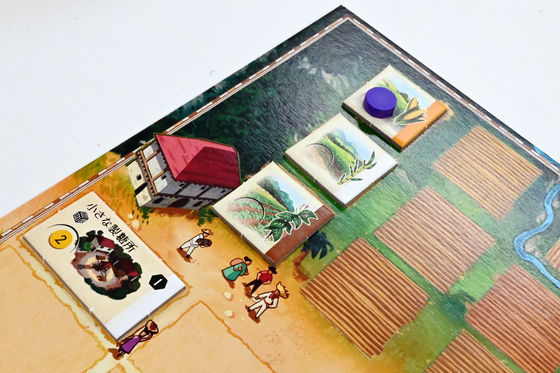
Before the production of other players is ready, the corn that can be produced is sold to the store as a 'merchant'. The selling price of corn is 0 doubloons, but you get 1 doubloons with the privilege of a merchant. It is not possible to line up similar products at the shop, so if you do not sell them before others have left anything, your products may be in bad stock.
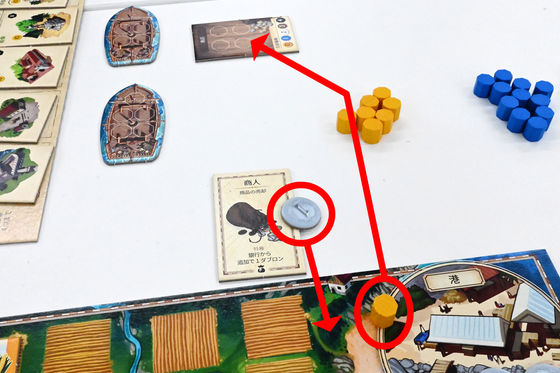
Further clearing progressed, and a coffee plantation was born.
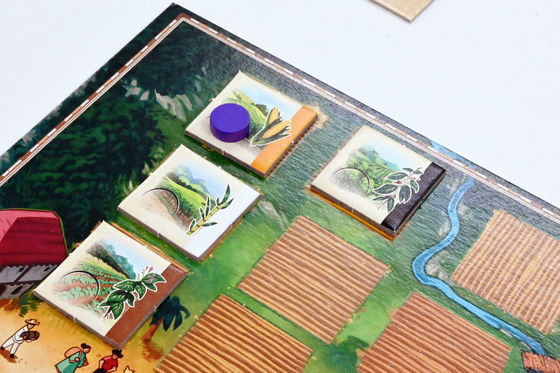
I had the opportunity to have 1 doubloon on top of the 'architect', so I took advantage of that 1 doubloon, the cost of architect privileges-1 doubloon, and 4 doubloons on hand to make 6 doubloons of 'coffee roasters'. ”Build.
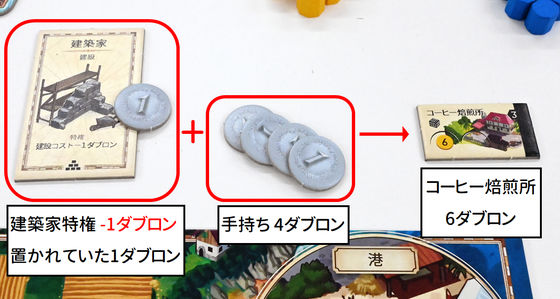
In the subsequent 'master' phase, workers are assigned to coffee plantations and coffee roasters, respectively. We have set up a coffee production system.
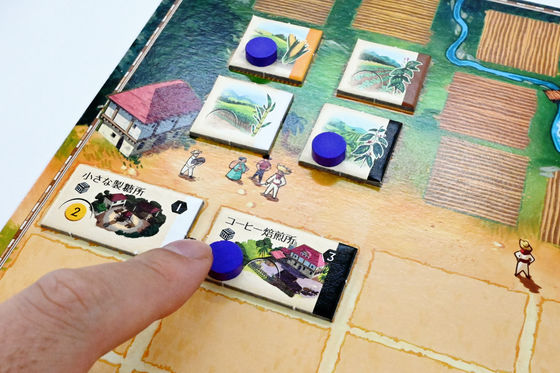
However, it cannot be produced well immediately, and there is also a phase of digging gold veins and putting up with it.
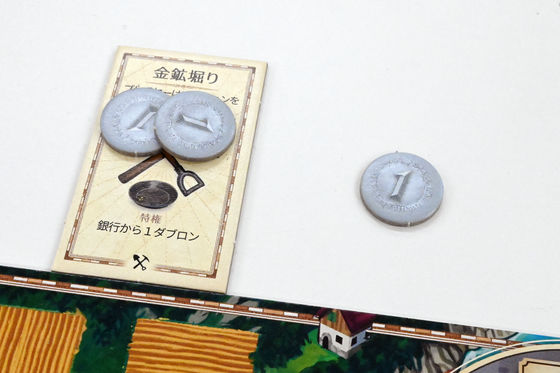
Ship corn in the meantime and get 1 victory point.
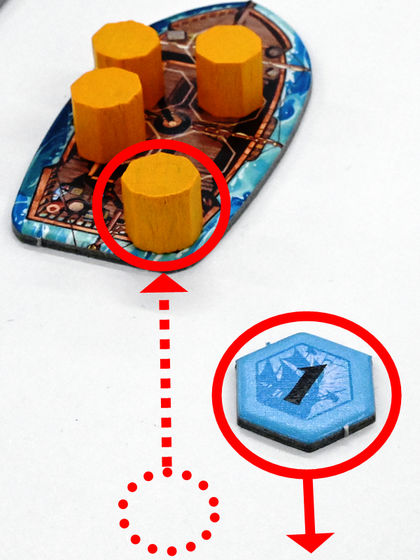
The player next door used the 'black market' and the privileges of the architect to build a 'trading post' that would cost 5 doubloons while having 2 doubloons on hand.
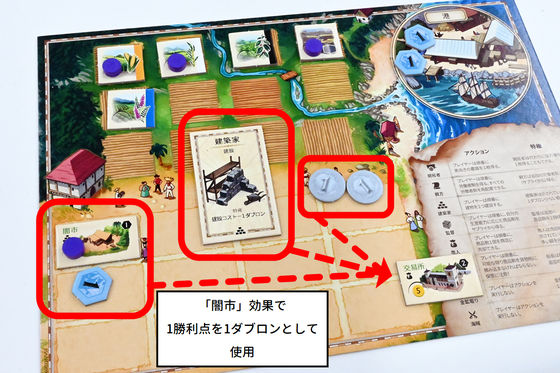
Our farm does not produce much, but with the privilege of 'supervisor', we get an additional coffee.
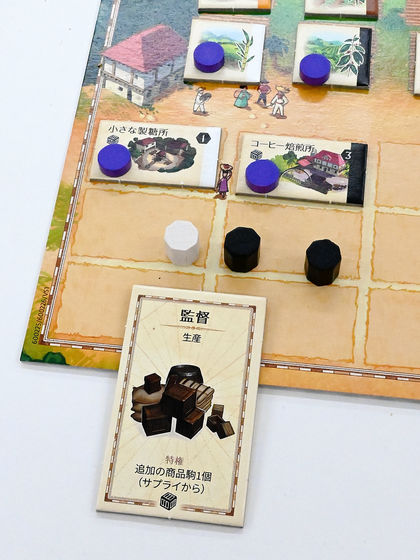
I was able to run the 'merchant' just in my turn, so I sold coffee for 4 doubloons and got an additional 1 doubloons. In addition, 1 doubloon was accumulated on the 'merchant' card, so a total of 6 doubloons was secured, which is a fairly delicious income.
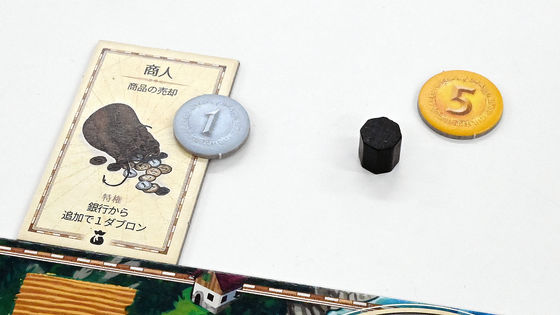
After shipping, you can store only one item piece at the port, but if you have a 'storage', you can store three additional item pieces. This will reduce the number of product pieces that cannot be shipped and are returned to the supply, and will be converted into income in the next and subsequent phases.
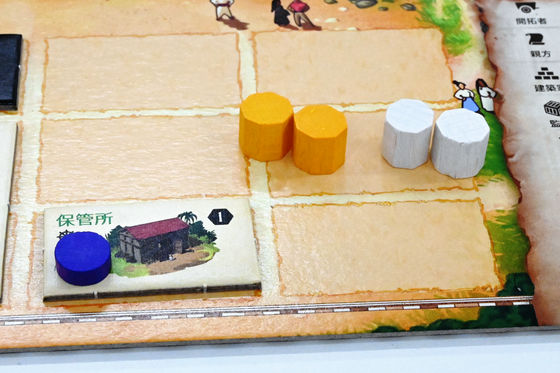
I've accumulated a lot of doubloons at hand ...
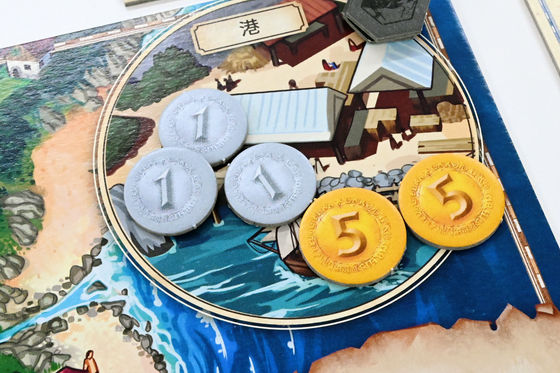
Build a 10-cost 'statue' at once.
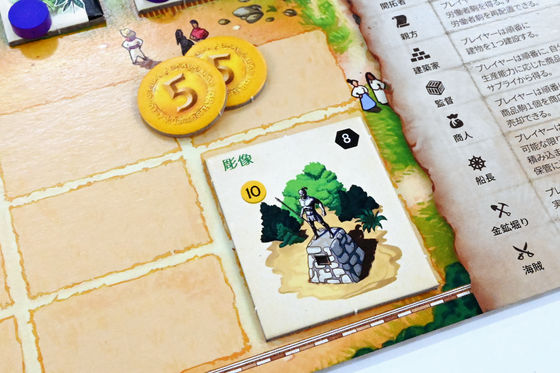
I saved doubloons again and took the 'architect' in my turn, so I built the second big building 'monastery'.
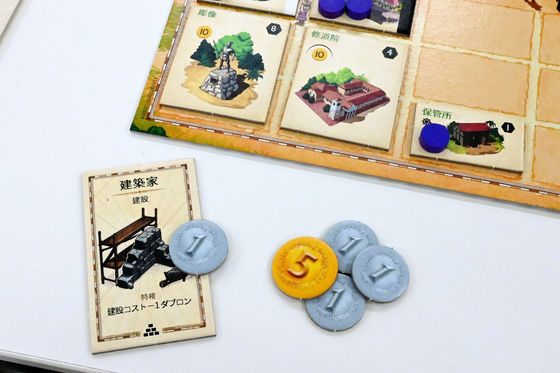
We will continue to cultivate the farm so that we can receive the benefits of the 'monastery' as much as possible. In this state, there are 3 sets of corn, cigarettes, coffee and 3 discs, so you can get an additional 6 victory points.
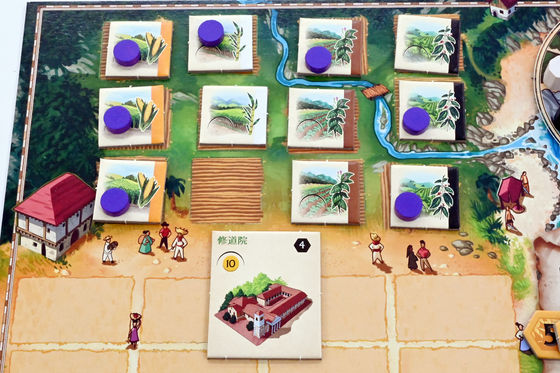
However, he couldn't get the sugar plantation until the end, and the score was 47 points.
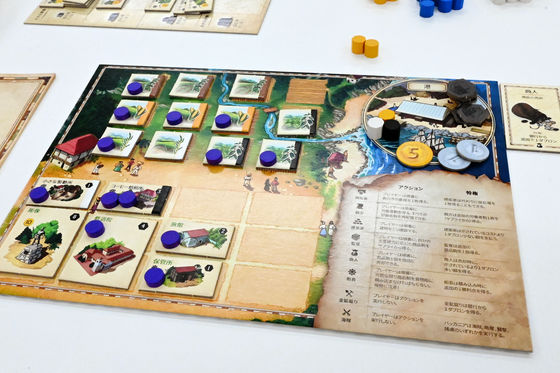
The 1st place player promotes indigo production from the beginning. We couldn't build a big building, but by building a waterway and a specialized factory, we could get 5 indigo + 4 doubloons in one production and expand the equipment steadily. I got 60 points.
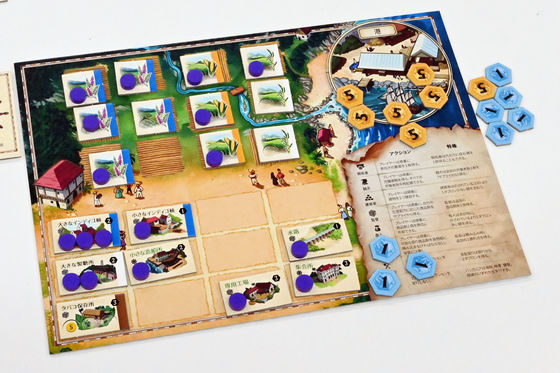
This expansion 1 doesn't have to replace everything with the buildings in the core set, so each time you play it creates a different combination and a different playstyle, which is very refreshing.
Next, I will challenge Expansion 2. The article will be published at a later date, so stay tuned.
・ Continued

Related Posts:





